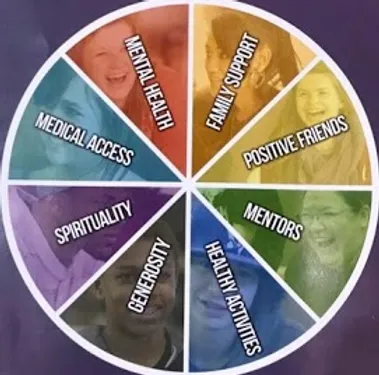Twelve Talks to
Have With Teens
Sources of Strength
Focusing on their strengths can help people get through tough times.
Talking to your teen about their sources of strength can help them know what to do and where to turn when they need help or support.
The “Sources of Strength” model helps teens use a strength-based approach to mental health. The Eight Sources of Strength are:
Generosity: Generosity includes acts of kindness towards others, big or small, and can actually make an impact on how we feel about ourselves. Being generous can often give a sense of purpose and meaning in our lives.
Spirituality: Spirituality is experienced in many ways, including practicing gratitude. At its core, spirituality is about what feeds and lifts our spirit, no matter what our cultural heritage and/or spiritual tradition.
Medical Care: Medical care allows us to take care of our bodies, hearts, and minds, and to get help when we need it.
Mental Health: Mental health is all about getting the support we need and deserve to live life fully. Talking to a trusted person, a counselor, or a doctor, can help empower us to overcome struggles we might be facing.
Family Support: Family support comes from people who support, nurture, and care for us, whether our family is related to us by blood or by choice.
Positive Friends: Positive friends lift us up, make us laugh, are honest with us, and are there for us when we need them.
Mentors: Mentors share their insights and experiences to help guide us, to help us draw on our own strengths, and to be the best version of ourselves.
Healthy Activities: Healthy activities – whether they are physical, social, or emotional – help us unwind, lift our mood, and gain clarity.
Video - Sources of Strength
Open Ended Questions
Here are some open ended questions you can use to talk to your teen about sources of strength:
- Where do you get strength when you need it?
- What is your greatest strength?
- Who in your life can you turn to when you need help?
- What strength do you tap into when you are feeling stressed or anxious?
- What are your/our family’s strengths?
- What are some ways that your friends support you and make you happy?
- What are your spiritual beliefs?
Conversation Starters
Show your teen the Sources of Strength wheel and ask if they have seen it around their school. Then ask open-ended questions about it.

Comment positively about your teen’s healthy coping strategies (e.g., sports, art, music, animals, and reading), including how you can see that the activity relaxes them, helps them unwind, brings them closer to friends, or helps them express themselves.
Tell a story about when a family member got through a tough time and what they relied on to get through it.
Ask if your teen has a Sources of Strength program at their school and what kinds of things the program does. If your teen does not have a Sources of Strength program at their school, ask what parts of their life gives them strength.
Ask yourself
What does your teen consider to be their main strengths? Starting with an open mind is key to talking about sources of strength. If your teen’s strengths — or even how they define their strengths — are different from yours, that creates the potential for a great conversation that will help you better understand what makes your teen tick. Ask them what strengths they use to cope with the ups and downs.
How could you promote their feelings of resilience? When appropriate, remind your teen of times they have dealt with something going on in their lives by getting help. Consider sharing your stories of getting through tough times by relying on your own strength(s).
Are you asking for help when you need it? Do you encourage other adults to do the same?
No one should expect to be someone’s only source of strength, especially if they are thinking about suicide. If you or someone you know are in crisis, please contact Colorado Crisis Services, available 24/7, at 1-844-493-8255 or text “TALK” to 38255.
A list of resources for help with food, employment, housing, medical access and more is available here. Help spread the word in Jefferson County that asking for help IS an act of strength.
Data included on this page includes:
Healthy Kids Colorado Survey 2023 (HKCS 2023)
Jefferson County Communities That Care Youth Town Hall 2024 (YTH 2024)

